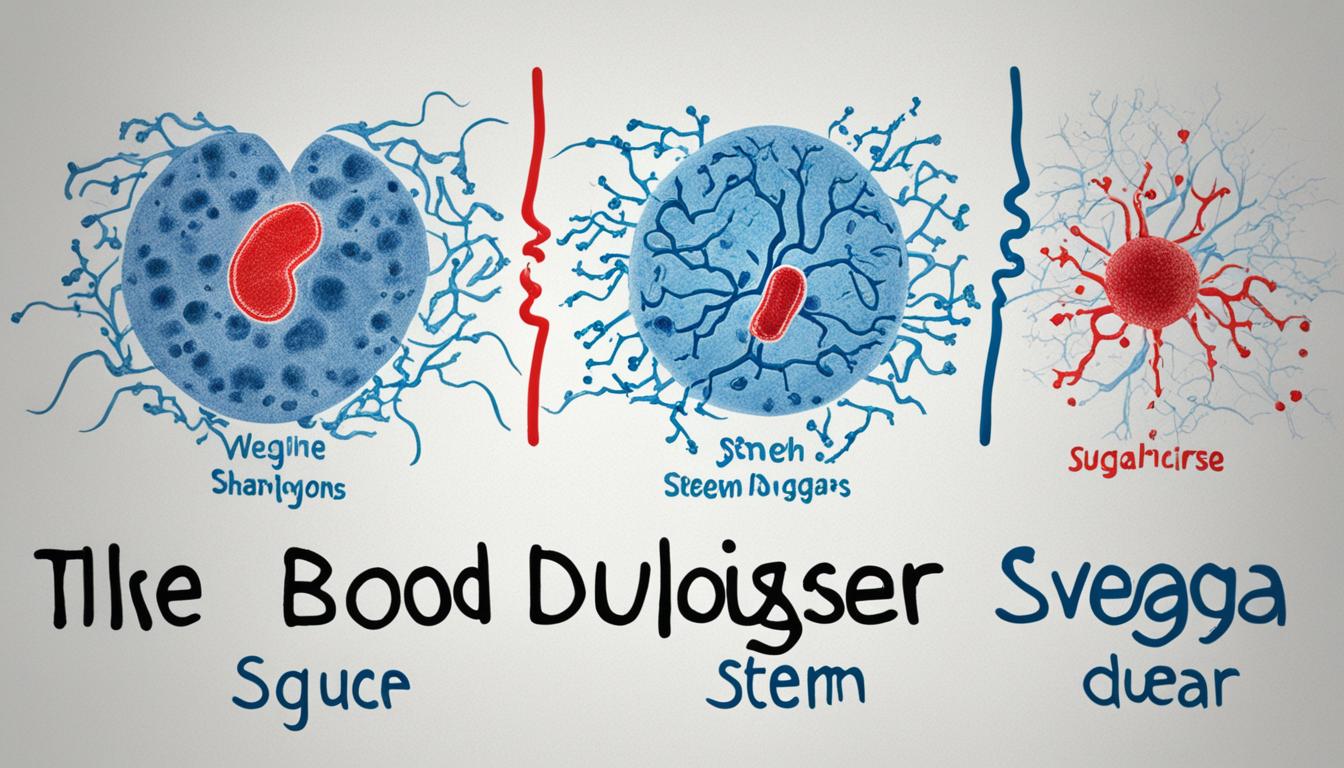Hypoglycemia is when your blood sugar drops too low. It can be serious, even life-threatening, in severe cases. Many factors can cause hypoglycemia, with diabetes medication being a common one.
You might feel tired, shake, sweat, get a fast heartbeat, feel dizzy, or be confused with low blood sugar. If not treated, you could have a seizure, pass out, or fall into a coma. Several things can lower your blood sugar, like skipping meals, exercise, certain drugs, and health problems.
Keeping blood sugar stable is important for our bodies to work right. The hormone called insulin is key to this process. Low blood sugar is a concern for people with diabetes.
Stem cell therapy offers hope for managing diabetes and low blood sugar. Scientists are researching how stem cells could help make more insulin. This could help better control blood sugar.
Key Takeaways:
- Hypoglycemia is a condition where the levels of glucose in the blood are abnormally low.
- Symptoms of low blood sugar include tiredness, shaking, sweating, heart palpitations, dizziness, and confusion.
- Untreated low blood sugar can lead to complications such as seizures, loss of consciousness, and coma.
- Various factors contribute to low blood sugar, including not eating enough, increased physical activity, certain medications, alcohol consumption, and more.
- Diabetes management plays a crucial role in preventing low blood sugar.
- Stem cell therapy holds promise in improving insulin production and regulating blood sugar levels.
Factors Affecting Blood Sugar Levels and Complications
Regulating blood sugar is important for good health. The process turns carbohydrates into glucose and uses insulin to move it into cells. When this process falters, blood sugar levels can go haywire.
Both type 1 and type 2 diabetes can mess with how blood sugar is controlled. Type 1 doesn’t make enough insulin. Type 2 has a problem with how the body reacts to insulin. This leads to high blood sugar, or hyperglycemia.
Many things can change your blood sugar levels besides diabetes. Things like not eating, being active, taking certain drugs, or drinking alcohol can have an effect. Health problems like liver or kidney conditions and serious diseases can also disrupt your blood sugar. To keep things stable, it’s vital to live healthily and control these risks.
High blood sugar can cause big problems like dehydration, vision issues, or damage to your kidneys and nerves. But, low blood sugar makes you feel shaky, weak, or confused. It’s key to watch your blood sugar levels closely to avoid these problems and stay healthy.
Stem Cell Therapy as a Potential Treatment for Low Blood Sugar
Stem cell therapy is now a big hope for helping people with diabetes deal with low blood sugar. It’s all about using the power of stem cells to make more insulin and keep blood sugar stable. Many studies using various stem cell types have shown encouraging signs. They can help control glucose better and lower the chance of low blood sugar episodes in those with diabetes.
This therapy, used with other treatments, might even help some people not need insulin anymore. But, before it becomes a standard treatment, more study and careful testing is a must. We need to know if it’s really safe and works well in the long run for managing low blood sugar and diabetes. It’s a must to talk with doctors and follow their advice for the best care.
Considering stem cell therapy as part of a wider diabetes plan could be beneficial. It’s not a stand-alone fix, but something that can be used with regular check-ups, medicines, proper diet, and lifestyle changes. Talking to healthcare experts will help assess if this option fits your needs. They can also help tailor a plan that’s just right for managing diabetes and low blood sugar.

